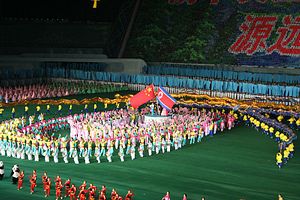For all of Chinese President Xi Jinping’s globe-trotting over the last two years, the most notable destination might be one Xi hasn’t visited — close neighbor North Korea. As time goes on, his failure to visit a country that predecessor Hu Jintao described as being as close with China as “lips and teeth” becomes increasingly glaring. Is it really possible that Xi has had no time in his schedule to make the hour flight east from Beijing to Pyongyang, and yet has managed to visit New Zealand and Fiji? Does a president who professes his love for Russian, German, and American food and culture find the prospect of a day or two of North Korean-style kimchi and mass games so unappetizing? And things only get worse when we remember that Xi has already visited South Korea, in July 2014, upending the usual protocol of Chinese state leaders traveling first to the North before traveling to Seoul.
One of the few insights from inside North Korea in recent years about the real attitude toward its greatest perceived patron and ally comes from former DPRK counter-intelligence operative Jang Jin-sung. In Dear Leader, Jang’s account of his defection to South Korea via China in 2004, he doesn’t mince words when it comes to China-DPRK relations. “The country Kim Jong-il hates most is China,” Jang explains to one puzzled ethnic Korean living in China. Jang goes further. While the 38th parallel might be a geopolitical barrier dividing the Korean peninsula, the border between China and the DPRK is an “ideological demarcation line,” he explains — a far more dangerous border in the mind of Kim Jong-il. Socialism with Chinese characteristics could have an application in the DPRK far more resonant than South Korean-style capitalism, but would spell the almost inevitable end of the Kim family’s own dominance and the collapse of the world of mirrors they have built to shore up their power.
Jang recounts the one moment when he felt Kim Jong-il stood up to China, by going unannounced to the Chinese embassy in Pyongyang in the early 2000s to express his irritation at Chinese closeness to the South. The net result of this, in Jang’s interpretation, was that Kim the elder was hauled on state visits to China twice and forced to “inspect” Shanghai and the economic zones in the south. Chinese leaders felt Kim was looking at a possible future of reform and change for his desperate country. What Kim evidently really saw was a political and personal tombstone being pushed toward him. Tepid reforms in the DPRK once Kim returned ended up being abandoned or only half carried out. If Jang is right (and Andrei Lankov’s work backs him up), for the DPRK there is no plan B, and particularly not one proposed by Beijing. The rest of the world should take no comfort from thinking that China can solve the DPRK problem, because (according to this line of thinking) China is the least likely to inspire change.
For this reason, while Xi may host the young Kim Jong-un this year, it is likely that his face will be even stonier than when he finally met Japanese Prime Minister Shinzo Abe last November. Abe at least is the leader of a significant economy, a major geopolitical player, and an accomplished politician. Xi might not like him, but there is respect. The idea of a juvenile in charge of a wrecked economy blackmailing his way into Zhongnanhai through tantrums and threats will stick in the gullet of a leader who is showing increasing diplomatic poise and ambition. Under the framework of Xi’s “China Dream,” the world is dominated by grand new narratives – major power models, the new Silk Road, civilizational partnerships. The DPRK is an increasingly ugly and unwanted fly in this ointment.
While Xi has been eloquent in his flattery of foreign partners that matter to him, for the DPRK he has shown mostly a tight-lipped icy disdain. When one considers how cheap and easy diplomatic flattery is, Xi’s silence proves that on the China-DPRK relationship at least we can be pretty sure what Xi really thinks.

































